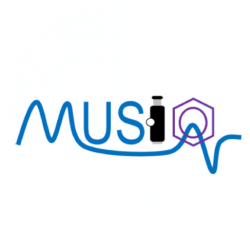Background free ultra-sensitive Frequency-Modulation SRS
Position Filled
Supervisor Dr. Hervé Rigneault
Institute Fresnel, CNRS
Job Description
Research program: The aim of this PhD research program is to develop an ultra-sensitive background free microscopy scheme for vibrational imaging by means of stimulated Raman scattering (SRS). Based on our recent developments on three colors SRS whose frequencies can be arranged to address the same or two different vibrational frequencies, together with advanced modulation schemes and parallel excitation, we will build a shot-noise limited background free SRS microscope optimized for cell and tissue imaging at high speed. The insensitiveness to the sample background will come from the rapid jump (MHz rate) between stimulated Raman loss and gain or between two different vibrational frequencies. We will further explore the possibility to enhance the SRS process by approaching the electronic absorption band for dedicated vibrational molecular tags. This will be possible using the flexibility of our dual optical parametric oscillators (OPO) laser system. Our ultimate goal will be to reach single molecule sensitivity with SRS.
Expected Results: The constructed SRS microscope should achieve ultimate molecular vibrational detection in complex samples such as cells and tissues. This should enable to achieve real time tissue molecular imaging based on endogenous molecules such as lipids and proteins but also to locate active exogenous molecules such as drugs in tissues and nanoparticles functionalized with dedicated Raman molecular tags. Ultimately, using electronic resonances, our goal will be to reach single molecule sensitivity using SRS. Investigated samples will come from ongoing collaborations with hospitals, pharmaceutical companies and MUSIQ core laboratories.
Planned secondments: Two secondments will actively support this research program. The first one (6 months at M18 will be with the German company APE that will be a key partner for the development of the SRS laser system and the various laser beam modulation schemes that will enable ultimate SRS sensitivity. The second secondment will be with the university of Konstanz (1 month at M32) that develops vibrational tags whose SRS detection can be enhance when approaching electronic resonances, this should allow single molecule detection using SRS.
Outreach activities: The PhD student will participate to the MUSIQ outreach program which is a multidisciplinary approach and format to create a large portfolio of programs and activities that target audiences in all areas of society (public fun science events, science demo in school,…)
Enrolment in Doctoral degree: Aix Marseille University, Doctoral school ED352 ‘Physics and matter science’ (https://ecole-doctorale-352.univ-amu.fr/en)
PhD research location: The research program will take place at the Institut Fresnel, Marseille, France (www.fresnel.fr) within the interdisciplinary MOSAIC group (www.fresnel.fr/mosaic)
REFERENCES:
[1] H. Rigneault, and P. Berto, “Tutorial: Coherent Raman light matter interaction processes,” APL Photonics 3 (2018).
[2] S. Brustlein, P. Ferrand, N. Walther, S. Brasselet, C. Billaudeau, D. Marguet, and H. Rigneault, “Optical parametric oscillator-based light source for coherent Raman scattering microscopy: practical overview,” J Biomed Opt 16, 021106 (2011).
[3] P. Berto, E. R. Andresen, and H. Rigneault, “Background-free stimulated Raman spectroscopy and microscopy,” Phys Rev Lett 112, 053905 (2014).
[4] S. Heuke, B. Sarri, X. Audier, and H. Rigneault, “Simultaneous dual-channel stimulated Raman scattering microscopy demultiplexed at distinct modulation frequencies,” Optics Letters 43, 3582-3585 (2018).
[5] S. Heuke, B. Sarri, A. Lombardini, X. Audier, and H. Rigneault, “Dual-focus stimulated Raman scattering microscopy: a concept for multi-focus scaling,” Optics Letters 43, 4763-4766 (2018).
[6] L. Wei, Z. Chen, L. Shi, R. Long, A. V. Anzalone, L. Zhang, F. Hu, R. Yuste, V. W. Cornish, and W. Min, “Super-multiplex vibrational imaging,” Nature 544, 465 (2017).
Detailed person specification
To include necessary Bachelors / Masters qualifications
Applicant should hold a master in physics, optical, electrical or bio-engineering and show a strong interest for biology and biomedical applications. Knowledge in chemistry is also welcome.
Short description of MUSIQ
MUSIQ is an innovative European Training Network (ETN) funded by the European Union’s Horizon 2020 Marie Skłodowska-Curie Actions programme, with the unique vision of developing the next-generation optical microscopy exploiting quantum coherent nonlinear phenomena. ETNs provide training through doctoral research to talented early stage researchers (ESRs). Through 15 ESR research projects, MUSIQ will establish an intersectoral training and research programme at the physics/chemistry/life science interface with partners from 9 European countries. MUSIQ ESRs will enrol on PhD degree programmes and be employed for 36 months in a beneficiary organisation. The consortium brings together a unique team of world-leading academic groups and industry, at the forefront of optical microscopy technology developments merged with fundamental understanding of ultrafast coherent light-matter interaction phenomena, development of quantitative image analysis tools, and biomedical/pharmaceutical real-world applications. MUSIQ aims at creating the next generation of skilled well-connected scientists that will pioneer the ‘quantum microscopes of tomorrow’.
Duration of post (fixed-term for 36 months) and ideal start date
Start date: between 01/04/2019 and 01/11/2019
Duration: 36 months
Exact salary: competitive salary plus allowances
Around: 2000€ /months
Eligibility details
ETNs recruit a specific type of researcher (ESR). Successful candidates:
- MUST at the date of recruitment, be in the first four years (full-time equivalent research experience) of their research careers and have not been awarded a doctoral degree. ‘Date of Recruitment’ means the first day of the employment of the researcher (i.e. contract starting date). ‘Full-Time Equivalent Research Experience’ is measured from the date when the researcher obtained the degree entitling him/her to embark on a doctoral degree programme.
- MUST NOT have resided or carried out their main activity (work, studies, etc.) in the country of the recruiting organisation (FRANCE) for more than 12 months in the 3 years immediately before the recruitment date. Compulsory national service, short stays such as holidays, and time spent as part of a procedure for obtaining refugee status under the Geneva Convention1 are not taken into account.
Applications are encouraged from all sectors of the community, reflecting the consortium’s commitment to equality and diversity. Female candidates are especially encouraged to apply.
English language requirements –It is a requirement that network ESRs have an ability to understand and express themselves in both written and spoken English to a level that is sufficiently high for them to derive full benefit from the network training
Application
Send a full CV, a motivation letter and two reference contact person to Hervé Rigneault ([email protected]), please also send your CV with a cover Letter to the MUSIQ consortium coordinator email: [email protected]. In the cover Letter please indicate the title of the project you are applying, and provide a brief motivation as to why you wish to become an ESR within MUSIQ. Please be aware that your CV may be shared with the named beneficiaries within the consortium, as part of the application review process, to ensure an open, transparent and merit based recruitment.
GDPR Statement: To read the full MUSIQ Data Privacy Notice, please see www.musiq-etn.eu/musiq-data-privacy-notice

